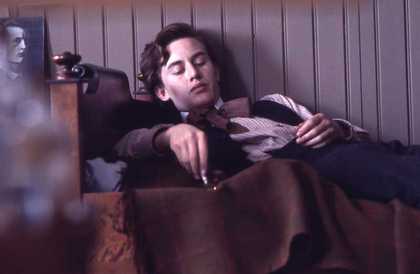The Journey
Peter Watkins, Sweden, Canada, Australia, New Zealand, Soviet Union, Mexico, Japan, Scotland, Polynesia, Mozambique, Denmark, France, Norway, West Germany and USA, 1987, 16 mm, 870 min
Following Tate Modern’s 2012 retrospective of Peter Watkins’s work, this special screening event offers the unique opportunity to see Watkin’s monumental film The Journey in its complete duration of 14 hours and 30 minutes.
The Journey traces the systemic impact of the global nuclear regime across 12 countries, building an intricate series of connections between the state of the arms trade, military expenditure, the environment and gender politics that are more relevant than ever.
Working collaboratively with activist groups from Sweden, Canada, Australia, New Zealand, Soviet Union, Mexico, Japan, Scotland, Polynesia, Mozambique, Denmark, France, Norway, West Germany and USA, over three years, The Journey is an astonishing epic that succeeds in expanding documentary’s powers of polemic, reflexivity and inspiration.
Support groups debate the peace process, families discuss their fears of nuclear threat and the cost of world hunger, survivors recall the bombings of Hiroshima and Nagasaki while Watkins analyses the role played by mainstream media in normalising conflict. Peter Watkins’s vision of a political cinema that emerges from and documents the collaborative process which it analyses, reaches its most elaborated form in The Journey which is structured in 19 intricately edited chapters. The result is an unprecedented cinematic constellation whose inspiration and importance has only increased since its release in 1986.
Since the late 1950s, Peter Watkins’s films such as Culloden 1964, The War Game 1966, Punishment Park 1970, Edvard Munch 1973 and La Commune 1999 have reinvented historical drama and future speculation into impassioned, insurgent political cinema. And yet The Journey 1987, Watkins’s most sustained experiment with documentary, has not been screened in London since its LUX screening in 2003. In the wake of the partial meltdown of the Fukushima Daiichi nuclear power plant on 11 March 2011, the critical relevance of The Journey can be neither doubted nor overlooked.
Presented by Tate Film in collaboration with The Otolith Collective. Introduced by The Otolith Collective, with guest speakers and audience discussion after each screening.
Schedule
Friday 17 May 2013
18.00 – 22.00: Chapters 1 – 4
Saturday 18 May 2013
11.00 – 13.00: Chapters 5 – 6
14.00 – 18.00: Chapters 7 – 9
19.00 – 22.00: Chapters 10 – 13
Sunday 19 May 2013
11.00 – 13.00: Chapters 14 – 15
14.00 – 18.00: Chapters 16 – 19
- Download the programme notes [PDF, 2MB]

